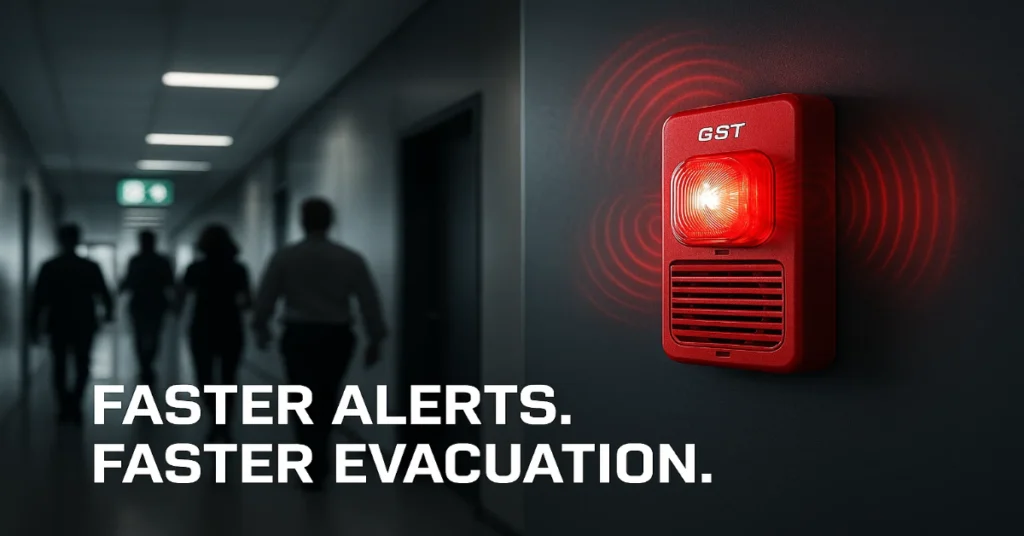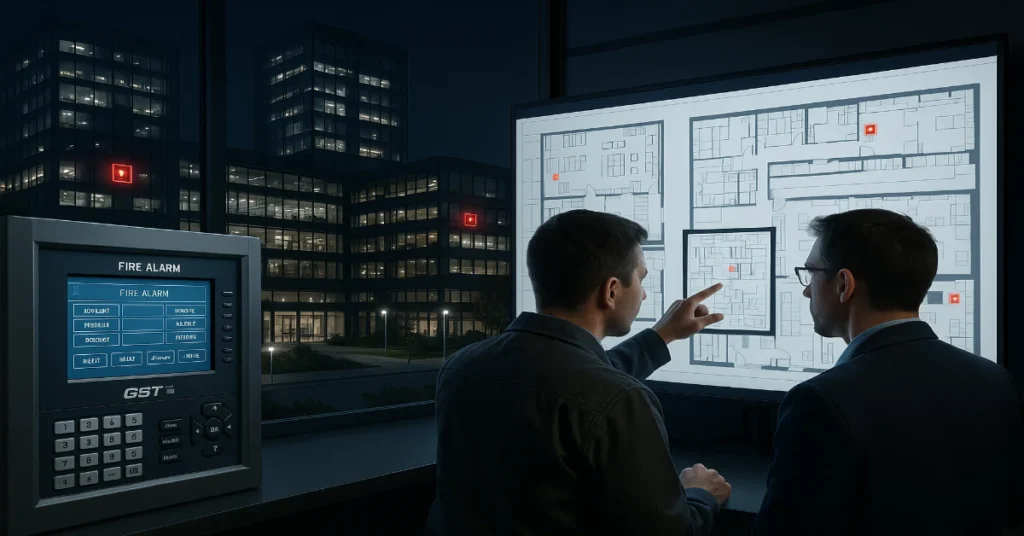How GST Sounder & Strobe Modules Improve Evacuation Efficiency

A system that sounds the alarm is not enough. A system that moves people to safety is what matters. A scenario most fire engineers have witnessed.. It was a corporate building evacuation drill scheduled for 3:00 PM.At 2:57 PM, the fire panel detected smoke in the electrical room on the 6th floor. The alarm activated right on time. On paper, everything worked. On ground, the reality was different. A group of employees wearing noise-cancelling headphones kept working.The cafeteria staff assumed it was a scheduled drill.Two floors below, people heard the alarm but didn’t feel urgency.Some started walking toward staircases, but congestion built up because every floor reacted at the same time. The system alerted.But it did not move people efficiently. This is the exact gap GST Sounder & Strobe Modules are designed to close. Evacuation Efficiency Is More Than Alarm Activation Fire detection has evolved rapidly. Most buildings today are equipped with addressable fire alarm systems.But evacuation still fails when: The key challenge is no longer detecting fire early.The bigger responsibility is moving people quickly, safely and in an organized flow. This is where multi-sensory alerting changes outcomes. Why GST Sounder & Strobe Modules Matter in Modern Fire Safety The core advantage of GST sounder and strobe modules is simple: They don’t just notify. They compel action. Here is how they achieve this: Audience Attention Is Captured in Two Channels Relying only on sound is risky.Busy, loud, or acoustically complex environments absorb, distort, or overpower alarm tones. Adding strobe lights ensures that even when sound competes with background noise, visual alerts deliver undeniable urgency.This dual sensory alert drastically reduces delayed reactions. Clear Alerts Beat Loud Alerts Evacuation failures rarely happen because alarms are not loud enough.They happen because alarms are not clear and actionable. GST sounders are engineered to maintain tone clarity across distances and ambiences.This makes it easier for occupants to instantly recognize a fire alarm instead of questioning the signal. Addressability Enables Intelligent Evacuation A major advantage that experienced engineers value is controlled evacuation. Unlike conventional sounders that trigger everything at once, GST addressable modules support: This converts an uncontrolled mass evacuation into a managed response. Highly Effective in Sensory Challenged Environments Strobe integration is critical in: Here, light often communicates faster than sound. Minimal Response Time Between Alert and Action When humans see and hear an alert simultaneously, decision time shortens.There is less uncertainty, less hesitation, less discussion and faster movement. Every 10–12 seconds saved in response time increases survival probability significantly in high-occupancy facilities. Designed for Real Buildings, Not Lab Conditions Experienced fire engineers design systems for the reality of human behavior, not ideal assumptions.A real evacuation landscape includes: GST sounder & strobe modules were built to address these human factors rather than assuming perfect compliance. Typical Improvements Observed After Deployment Buildings that upgrade to GST sounder & strobe networks often report: Most importantly: People start moving without needing confirmation from others. Integration Within a Smart Fire Safety Ecosystem GST sounder and strobe units do not work as isolated devices.Their real value comes from how they integrate within the system architecture: This creates one unified alerting system instead of scattered alarm points working independently. Engineer-Focused Technical Advantages Fire engineers repeatedly highlight these operational strengths: These are small engineering details that make a large field difference during real deployments. Human Response Science Supports Multi-Sensory Alerts Evacuation psychology emphasizes key behavioral patterns: GST sounder + strobe modules directly address each of these human tendencies using multi-layered signaling. Where These Modules Deliver the Biggest Impact Although universally applicable, the modules show exceptional improvement in: These are locations where evacuation delay is not just risky, it is unacceptable. A Realistic Comparison When only sound-based systems operate in complex environments: When GST sounder + strobe modules operate: This difference is not just measurable, it is visible in first 60 seconds of evacuation. Final Perspective for Fire Safety Professionals A fire alarm system is evaluated in two moments: Detection is engineering.Evacuation is human behavior. GST Sounder & Strobe Modules bridge the gap between both by ensuring alerts are: A building does not evacuate faster because the alarm works perfectly.A building evacuates faster because people understand the alarm without hesitation. That is the true value of an evacuation alert system. And that is precisely what GST (Gulf Security Technology) delivers. FAQ’s Does visual alerting significantly change evacuation behavior?Yes. Visual urgency eliminates ambiguity, especially in high-noise and high-distraction zones. Are strobe modules essential in buildings with strong acoustic coverage?Absolutely. Even in well-covered acoustic spaces, factors like headphones, partitions, fatigue and distraction reduce audio alert effectiveness. Can these modules support phased evacuation criteria?Yes. Their addressability enables controlled, command-driven or algorithm-based evacuation sequencing. Do they increase system load or complexity?No. Their efficient current profile and loop integration maintain system stability without heavy infrastructure changes. Read Also: Why GST Panels Are the Most Budget-Friendly Choice for Multi-Building Projects Read Also: How to Reduce Detector Response Time Using Smart Loop Mapping
Why GST Panels Are the Most Budget-Friendly Choice for Multi-Building Projects

You don’t choose fire alarm panels from a brochure.You choose them from experience, from sleepless commissioning nights, delayed handovers, over-budget cable BOQs, false alarm escalations and stakeholders who want maximum reliability at minimum cost. After 10, 15, or 20 years in this industry, you already know one truth: ❌ The cheapest fire system is never the one with the lowest price tag.✅ The cheapest system is the one that costs the least for the next 10–15 years. Multi-building projects amplify every risk; long cable runs, networking failures, maintenance challenges, integration gaps, repeated shutdowns and high AMC overheads.One weak component doesn’t just affect a floor. It affects an entire campus. And that’s why, when most seasoned engineers evaluate systems for large sites, their checklist quietly shifts from: ❌ “Which panel is cheapest to buy?”to✅ “Which panel is cheapest to own, operate and scale?” This is the turning point where GST Fire Alarm Panels consistently move from comparison tables to final design drawings. Not because they are marketed as budget-friendly…But because engineers who deploy them realize one thing very soon: GST doesn’t cut corners. It cuts costs where it actually matters in cables, commissioning hours, false alarms, maintenance, downtime, networking and long-term reliability. And that difference becomes most visible in multi-building projects, where fire systems are not just installed… they are lived with for decades. Let’s understand with a real world example given below. A Real-World Reality Check Every Fire Safety Engineer Has Faced… It was 8:30 AM on a project site with 14 interconnected commercial towers.The fire consultant, let’s call him Mr. Arjun, had spent 18 years designing fire alarm systems. He had seen every possible challenge, false alarms at 2 AM, budget cuts at 30% progress, integration failures, expensive AMC contracts, cable wastage and the biggest pain point of all: “Fire alarm systems that look affordable on paper but become expensive in execution.” The project stakeholders wanted one simple thing: Arjun knew one thing clearly, for multi-building environments, the real cost isn’t the panel price. It’s everything that comes after it. And that exact realization led him to choose GST (Gulf Security Technology) Fire Alarm Panels. Today, most experienced fire engineers agree on one point: For multi-building deployments, GST panels are not the cheapest option.They are the most cost-efficient option. Let’s break down why this statement is true. What Engineers Really Mean By “Budget-Friendly” Budget-friendly in fire safety does not mean low purchase price.It means low total cost in the long run, including: Cost Factor Traditional Panels GST Panels Initial hardware cost Medium to low Medium, optimized for scale Cable and installation cost High 30–45% lower due to loop efficiency Commissioning time Long Fast, Intelligent loop mapping Fault diagnostics Manual, time-consuming Auto-identified location False alarm expenses Higher Much lower AMC & spare parts Expensive Economical & widely available Multi-building integration Complex Native networking, very efficient Downtime loss High risk Low risk Conclusion:GST panels reduce expenses before, during and long after installation. 1. Built for Multi-Building Architecture (Without Extra Spend) Most fire panels struggle when scaled across: These projects typically demand: How GST Solves This Smartly: ✔ Supports large loop capacity per panel✔ Allows networkable multi-panel architecture without expensive add-ons✔ Central monitoring without complicated integration layers✔ Stable communication over long distances Benefit for engineers:You design less, connect more and troubleshoot faster. 2. Smart Loop Design = Less Cable = Big Savings For large campuses, wiring cost often crosses the panel cost. Many legacy systems require: GST panels, with optimized loop capacity and stable device communication, allow: Most EPC teams report 30-45% reduction in overall wiring cost. This alone changes the financial outcome of the project. 3. Faster Commissioning = Less Man-Days on Site Time is money, especially in multi-building sites where: GST panels support: A system that takes 12 hours with other panels can take 5–6 hours with GST. For projects with 8, 10, or 15 buildings, this saves hundreds of engineering hours. 4. Fewer False Alarms = Hidden Savings Unlocked False alarms are not just a nuisance. They cost money through: GST detectors and panel logic are known for: Imagine avoiding just 2 false alarms per month in a 12-building campus.Over 5 years, the savings are massive. 5. Lowest Maintenance Complexity, Highest Spares Availability A fire system is only as good as its serviceability after 3–5 years. Engineers prefer GST for one major reason: “We can actually maintain it without burning the maintenance budget.” Reasons: ✔ Easy availability of spares in the market✔ No dependency on overpriced proprietary modules✔ Straightforward troubleshooting✔ Faster engineer onboarding✔ No need for OEM presence for every small fault This drastically reduces AMC cost and downtime. 6. Seamless Networking for Central Fire Command Rooms For multi-building sites, owners prefer: GST allows reliable panel networking without: ❌ Costly middleware❌ Unstable third-party protocols❌ Complex integrations Everything works efficiently under one ecosystem. 7. Long System Life = Long Term ROI Most large facilities expect their fire system to run 12–15 years minimum. GST panels are built for: Cheaper alternatives may save 8–10% initially but can cost 3X more in the next 10 years. 8. Better Diagnostics = Less Downtime Loss In multi-building complexes, one fire loop fault can impact: Fast fault isolation matters. GST panels provide: ✔ Precise loop/device fault details✔ Quick replacement without system shutdown✔ Historical event logs✔ Clear service insights This is not just convenience. It is operational cost protection. 9. Scales Without Redesign Many fire panels work well for small buildings but fail to scale cost-efficiently in large deployments. GST architecture allows: 10. What Seasoned Engineers Really Care About Experienced engineers don’t evaluate panels based on brochures. They evaluate systems based on: Question GST Advantage Will this reduce my cable bill? ✅ Yes Can I commission faster? ✅ Yes Will false alarms reduce? ✅ Yes Can I maintain it without vendor lock-in? ✅ Yes Is long-term cost lower? ✅ Yes Is it scalable for 10+ buildings? ✅ Yes Will it make my life easier after handover? ✅ Yes This is why GST becomes the natural
